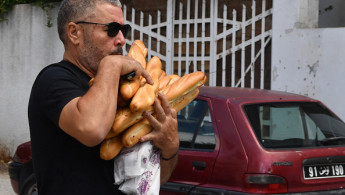Baguettes fall victim to Tunisia's economic crisis
Around 200 Tunisian bakers staged a sit-in Monday after a government decision to stop selling them subsidised flour, a move threatening the closure of hundreds of bakeries.
"We are being forbidden from producing baguettes," Mohamed Jamali, president of the Association of Modern Bakeries, told AFP in Tunis where the protest took place.
Last week the ministry of commerce banned some 1,500 privately-owned bakeries that produced European-style breads and pastries from purchasing subsidised flour, ending a practice that had lasted for more than a decade.
It came after President Kais Saied proclaimed in late July that there should be "one type of bread for all Tunisians" in an official video address.
According to Jamali, the European-style bakeries which employ around 18,000 people have been "unable to operate for a week" since August 1.
Demonstrators who rallied around him held up signs that read: "bread, freedom, national dignity," and "thousands of employees will be laid off".
اعتصم نحو 200 خباز وصاحب محل حلويات وعاملين فيها في #تونس العاصمة تنديدا بقرار إغلاق 1500 مخبز ومنعها من التزود بالدقيق المدعم. ورفعت لافتات كُتب عليها "أين حقي من الفارينة (الدقيق)؟" و"العدل والانصاف" و"خبز حرية كرامة وطنية".https://t.co/KpZRHJuca0 #فرانس_برس
— فرانس برس بالعربية (@AFPar) August 7, 2023
📸 @fethibelaid3 pic.twitter.com/t9BRRamOxF
"The people you see here today have not been able to carry out their regular activity, which is the production of bread," Jamali said.
Abdelbeki Abdellawi, 43, warned that some bakers might end up "facing imprisonment" because they can't afford to pay their rent or loans.
Tunisia's "modern bakeries" sell baguettes and other kinds of breads and pastries in which they use part of the subsidised flour.
"Why is there subsidised bread and unsubsidised bread? The purpose is to hit Tunisians in their purchasing power and threaten social peace," Saied had said on July 27.
The president criticised the "modern bakeries" for using subsidised flour to produce other types of bread sold at slightly higher prices.
"It is over today for those who want to sell unsubsidised bread. Measures must be taken to provide bread to all Tunisians," Saied said.
For several months, some 3,737 bakeries of a distinct network selling only subsidised baguettes at a cost of 190 Tunisian millimes (around $0.07 cents) - a price unchanged since 1984 - have been facing a flour shortage.
This has led to long queues forming outside the shops from dawn.
Economists told AFP that this "bread crisis" stems from an inadequate reserve of subsidised flour held by the Tunisian government, which centralises all purchases of basic goods.
Economist Ezzedine Saidane put the blame squarely on the government.
"The state did not buy enough cereals, so there isn't enough flour and therefore bread. There is a financial crisis and the government does not want to admit it," said Saidane.
He also insisted that the crisis will not be resolved "by imposing a unified price for bread".
Experts say the inflation-ravaged and heavily indebted country has been forced to stagger the flour supply to bakeries after suppliers started demanding payments up-front.
Baker Hanene Bouguerra, who employs around 30 people, criticised Saied in a post on Facebook, saying his remarks showed "a lack of comprehension of the situation".
"We are not the rich," she said. "You speak about the rich and the poor to divide and starve us! I am ready to go to prison to defend my rights."





 Follow the Middle East's top stories in English at The New Arab on Google News
Follow the Middle East's top stories in English at The New Arab on Google News


